Showing 621–630 of 1165 results
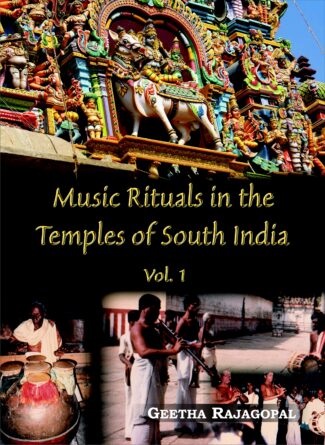
The book delves into the place of music in the Vedas and the role of temples, particularly in south India, in preserving and promoting musical traditions. It also concentrates on both vocal and instrumental music and dance forms as rituals in temples and temple festivals.
The book presents a wealth of information on the music rituals in temples at various places in south India. Following visits to a number of temples and based on interviews with temple artistes, the author shows that the musical traditions of temples differ from temple to temple, particularly from Vaishnavite to Shaivite temples.
Beginning with the place of music in the Vedas, the book discusses music itself as a form of worship and the role of temples in promoting it. It focuses on the musical contributions of Nayanmars and Alvars whose hymns are sung today as a daily ritual in many temples, and compares their music. It concentrates on both vocal and instrumental music, dance forms as rituals in temples, and music and singing involved in temple festivals. Many interesting inscriptions and sculptures related to dance and music have also been taken up for discussion. In a fascinating attempt, the author has dealt with unique music traditions in some temples of south India like ragas associated with specific temples only and the tradition of nadasvaram playing in Tiruvarur temple.
The volume will enthral scholars of Indology, particularly those involved in study of religious art and music traditions.
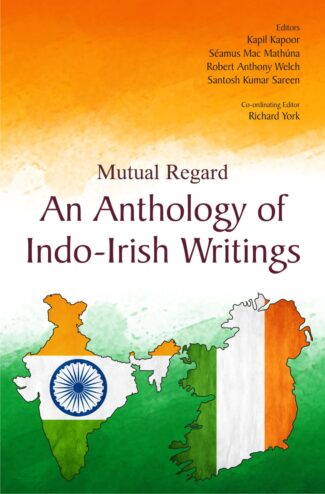
This is an anthology of parallel texts from the Irish and Indian intellectual traditions. It shows that, despite major differences between the two countries, contacts and similarities between them have been substantial. It records testimonies of Irish people and Indians who have visited the respective countries.
This is an anthology of parallel texts from the Irish and Indian intellectual traditions ranging over what scholars have said about the two countries histories of turmoil, their philosophies of mind and being, their myths and fantasies, their contemplative imagination as expressed in their lyrical poetry, their learning in medicine, history, linguistics and poetics, the records left about them by Irishmen who came to India and by Indians who went to Ireland, and the contemporary engagements between the two countries.
The volume shows that, despite major differences between the two countries, contacts and similarities between them have been substantial. The recorded testimonies of Irish people and Indians who have visited the respective countries demonstrate that in both cases the experience has been a warm and encouraging one, which has led the visitor to become more aware of what is meant by nationality, what he or she has acquired from his or her country of origin and what he or she has gained by contact with another society and another culture. That the two appear to share the same spirit of the self is attested by the fact that they both end up in the twentieth century, by coincidence or destiny, with the symbolism in their flags of the same three colours orange, white, and green.

Setting out a spiritual dialogue between Saiva and Christian mysticism, the book articulates world-views of the mystical traditions of Saiva-Siddhanta, Kashmir Saivism, Meister Eckhart, Hadewijch, Julian of Norwich, St. Ignatius Loyola and of the Eastern Christianity.
If mysticism is hard to define, what is it then? Or, why have mystics often spoken about what they have realized notwithstanding the unspeakability of a spiritual experience? And, yet more significantly, how can a meeting point of different religious traditions be discovered at the mystical level? Focussing on these and other related questions, eminent scholars from varying religious traditions here explore the nature of mystical experience in two of the worlds major traditions: Hinduism and Christianity. Neither a comparative study of religious traditions, nor an attempt to develop an overall mystical theology, the book sets out a spiritual dialogue between Shaiva and Christian mysticism: a dialogue wherein the participants articulate worldviews of the mystical traditions of Shaiva Siddhanta, Kashmir Shaivism, Meister Eckhart, Hadewijch, Julian of Norwich, St. Ignatius Loyola, and of the Eastern Christianity. And, without taking any a priori intellectual position, each author here evolves his/her own tradition-specific perspective on mysticism letting the comparisons, if any, to surface in the dialogue itself. A spiritual dialogue, like the one this multi-author work embodies, holds a key to an insightful understanding between different people, cultures and faiths more specially in todays world riven, as it is, by fundamentalist forces and endless religious conflicts. The book will be a valuable acquisition for the scholars and spiritually interested readers alike.

The volume presents a critical study with English translations of the renowned Buddhist scholar Nagarjunas works, Mahayanavimsika, Pratiya-samutpadahrdayakarika and Pratiasamutpada-hrdayavyakhyana a prose work. While the translations are easy to understand, the comment-aries incorporate study of rare manuscripts like the Dunhuang manu-scripts (eighth-ninth centuries) to thoroughly examine the significance of Nagarjunas contributions to Buddhist religious philosophy.
No one can, perhaps, question the philosophical genius of Nagarjuna. In the dialectic of this AD second century Buddhist scholar also acknowledged as the founder of Madhyamika school, is seen the clearest expression of Shkyamuni Buddha’s profound, even the subtlest teachings. Here is, in three parts, a brilliant critical study, with readable English translations, of this time-honoured philosopher’s Mahayanavimshika (Verses on the Great Vehicle), Pratiyasamutpadahridayakarika (Verses on the Heart of Dependent Origination) and, these besides, of his prose commentary, Pratiasamutpadahridayavyakhyana (An Interpretation of the Heart of Dependent Origination). Part 1, comprising translation, is intended to present these Buddhist texts, is an accessible form, unencumbered by any critical apparatus. Part 2 provides text critical material as well as other comments for readers interested in something more than just the translation in isolation. In part 3 are incorporated, for specialists/scholars/academics, further critical comments in the light of the Dunhuang manuscripts (c. eighth-ninth centuries ad), relating to the Pratiyasamutpadahridaya. A remarkable combination of Jamiesons Sanskrit and Tibetan scholarship, this study is invaluable to anyone seeking a better understanding of Nagarjuna: the Buddhist philosopher and patriarch.
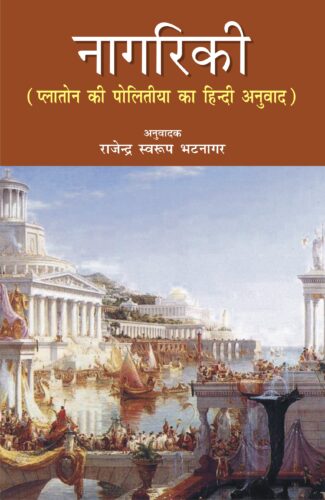
Nagariki is a Hindi translation of Politeia of Platon (Plato). Usually the subject matter of the book has been taken to be the organization of state or city and it has been thought that Plato is presenting an ideal form of the state or city. But it appears that this kind of discussion has been a way to present the notion of justice and to show how it is different from injustice and what is its role in the life of an individual and the city.
This book Nagariki is a Hindi translation of Politeia of Platon (Plato). A number of translations of this book are available in English entitled the Republic.
In fact the Republic is not the proper translation of Politeia of Platon for Plato did not accept the idea of democracy, on the contrary he had criticized this form of state.
Ordinarily the theme of the book has been taken to be state or the polity of a city. Usually it is understood that Plato is presenting an ideal form of a state. But it seems that the discussion of the forms of state is meant to show what is the notion of ßjusticeû, how is it different from the notion of ßinjusticeû and what significance it has in the context of an individual and the city.
Two things have specially been taken care of in this translation. First, that it brings us nearer the Hellenic or Greek atmosphere. Second, the dialogue has been presented in such a way that the conversation is taking place among the people who are intimate and familiar with each other. This translation aims to convey the notion of virtue and its relation to justice. In Politeia the discussion on virtue has been conducted in the context of both Þ individual as well as the city. As compared to other dialogues of Plato, the notion of virtue is highlighted in this dialogue in a more significant way.
The presentation of this translation has also been felt necessary because other translations in Hindi are not easily available.
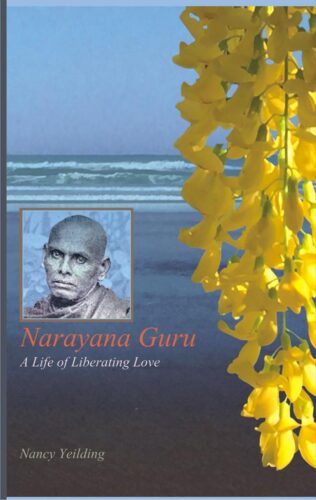
Here is a biography of Narayana Guru, which introduces him, faithful to his true form, as an embodiment of Wisdom. Although most extant biographies of the Guru were written by persons belonging to his own geographical and cultural background, this one stands an exception in this respect.
Narayana Guru’s major contribution to world culture comes from the example of his personal life and his philosophical and mystical writings in Malayalam, Tamit and Sanskrit. Both the cream of the ancient Dravidian culture preserved by the Tamil language and the Upanishadic wisdom enshrined by the Sanskrit language found their confluence in the writings of Narayana Guru. His mystical hymns are both inspiring and elevating. Without watering down the emotional fervor of devotion, he used these poems as a means to restate his philosophy of unitive understanding. Today, scholars all over the world are finding in his writings new avenues to approach the eternal riddles of life. The universal and thoroughgoing ethical norms enunciated by him are well suited to be used as the normative basis for the world order of a unified human family. His insight into psychology opens up the mysterious depths of the human mind and spirit, and if it is properly pursued, we can discover in its light the meaning and purpose of our life in the here and now, and the secret of establishing harmonious relationships with the rest of the world. -Guru Nitya Chaitanya Yati

Smrtis, in Indian spiritual lore denote the class of canonical texts that teach traditional laws, civil or religious. Such laws need periodical revision or modification, or even total nullifying and replacement. Narayana Guru took up the challenge to write Narayana Smrti an alternative new text fit for current times when he felt that the two-thousand-years old Manusmrti has became outdated.
Smritis, in Indian spiritual lore, denote the class of canonical texts that teach traditional laws, civil or religious, as against shrutis that reveal the eternal Reality. Such laws, as is to be presumed, need periodical revision or modification, or even total nullifying and replacement. Narayana Guru took up the challenge to write a new Smriti text when he felt that the two-thousand-years old Manusmriti has became outdated for modern times. Narayana Smriti is an alternative new text fit for current times while being fully in conformity with the traditional wisdom, espoused in Indian literature.
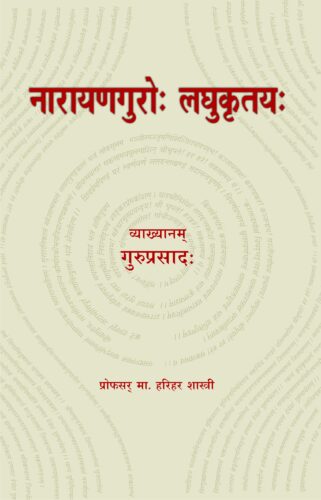
The book written in Sanskrit with original verses, provides details of shorter works of Narayana Guru, a great poet of southern India. Comprising 17 chapters, it highlights his anthologies in praise of Lords Ganapati, Subrahmanya, Siva, Visnu, etc.
The book written in Sanskrit with original verses, provides details of shorter works of Narayana Guru, a great poet of southern India. Comprising 17 chapters, it highlights his anthologies in praise of Lords Ganapati, Subrahmanya, Siva, Visnu, etc.
Natankusa of an unknown author is a unique work furnishing a first-hand account of Kerala theatre as practised in the medieval period. It also provides vivid account of Sanskrit plays like Ascaryacudamani of Saktibhadra as taken up in performance. In his attempt at critiquing the contemporary theatre, the author makes a threadbare analysis of the practices of cakyaras – the actors of Sanskrit theatre during his times. Kudiyattam, the Sanskrit theatre of Kerala has survived in actual theatre practice for about one millennium. It is recognized as a world heritage. Offering a brilliant critique of Kudiyattam, the author of Natankusa raises fundamental questions with regard to the relationship between the sastra and the loka – the theory and the practice. The present edition of Natankusa is based on fresh manuscript material will go a long way with the students and researchers of classical Indian theatre and will also serve as a manual for the practitioners of Indian theatre according to Bharata’s Naṭyasastra.
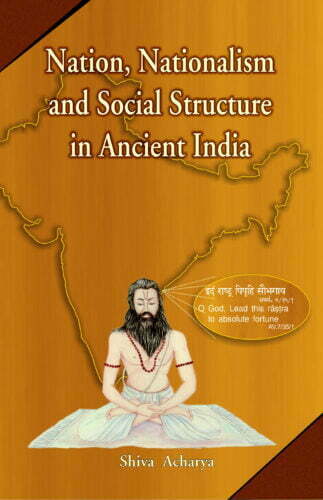
This book analyses various aspects of Vedic culture, exploring the origin of the concepts of rastra (nation) and rastrabhakti (patriotism). It presents the salient features of nation and nationalism in ancient Indian culture culture- based and not political which helped India to emerge successful.
The concepts of nation and nationalism are generally considered as having their genesis in western modes of thought. However, in this book, Dr. Shiva Acharya attempts to show that the theories of nation and nationalism can be traced to the Vedic era on the basis of a painstaking study of the Vedic culture and civilization. The book analyses the social, political, civil and military, economic, religious and philosophical aspects of the Vedic culture to explore the origin of the concepts of rashtra (nation), motherland and rashtrabhakti (patriotism), parliaments, the notion of all-round development, democratic educational system, equality of peoples and economic growth for prosperity in Vedic times. Citing from the Vedas and other Vedic literature and a host of modern scholarly researches on the subject, it presents the salient features of the nation and nationalism theories as found in ancient Indian culture such as their stress on culture-based nationalism rather than political. It points out that these features have enabled India to continue with its past traditions and culture and emerge as a successful nation in modern times. The volume will prove indispensable to all students and scholars of Indology and general readers as it unravels the immense contributions of ancient Indian thought to ideas and philosophies that hold great sway in modern times.
| There are no products |